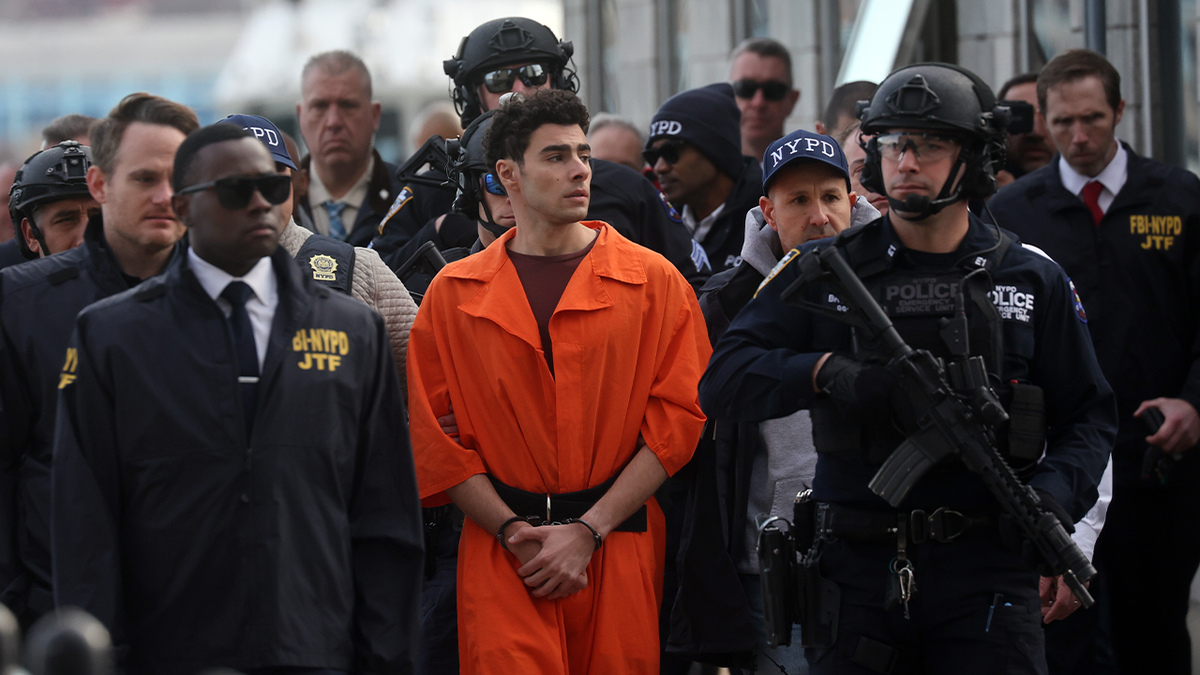

The media continue to bend over backward to avoid the overtly political nature of the murders of conservative activist Charlie Kirk and UnitedHealthcare CEO Brian Thompson — while President Donald Trump has taken the step of "designating" Antifa as a terrorist organization.
So, with political violence on the rise — undeniably from the left — will we finally see federal terrorism charges against domestic actors committing political violence on the home front? Will the likes of Tyler Robinson and Luigi Mangione now face federal terrorism charges?
Alas, as the law is currently constructed, we will not.
That should change. Not by simply "designating" domestic groups as terrorists; that actually won’t change anything when it comes to charging "domestic terrorism."

Charlie Kirk throws hats to the crowd after arriving at Utah Valley University on September 10, 2025, in Orem, Utah. (Trent Nelson/The Salt Lake Tribune/Getty Images)
No, there’s a simpler, less politically charged means available. And the blueprint is already proven.
Some background: The way the federal law is structured now, only foreign groups can be designated as "terrorists." The fear among legislators has been — and remains — that the ability to designate a domestic group as "terrorists" could be used as a cudgel by both sides of the political aisle.
As a result, federal prosecutors twist themselves into pretzels to charge violent acts committed by politically inspired actors on the home front. Mangione’s federal murder prosecution, for instance, rests on the foundation of a weak stalking statute; as of this writing, any federal case against Robinson would likely look similar.
But is the process of "designation" — the pre-labeling of a group by the executive branch — actually necessary? Would it not be preferable to leave to the court process the decision as to whether violence committed for ideological purposes qualifies as "terrorism"?
The model for how to do this exists already in the federal hate crime regime. Simply put, there are violent acts that qualify as "crimes-of-hate" if they are inspired by animus against certain groups on the basis of race, religion, etc.
Whether you agree with hate crime statutes or not, they have survived legal scrutiny. So why not apply the same model to terrorism?
TRUMP COULD TARGET ANTIFA WITH ‘POWERFUL’ RICO ACT, COUNTERTERRORISM EXPERT SAYS
Here’s how it would go. First, there would be a list of various serious crimes that qualify. These would be either violent felony-level acts or the support or funding of such acts.
Then, when charging that crime, the prosecutor would have to allege, and then prove, the perpetrator’s intention to influence government policy or coerce the civilian population (the federal definition of what constitutes "terrorism").

Luigi Mangione, suspect in the killing of UnitedHealthcare CEO Brian Thompson in New York City, arrives at a heliport with members of the NYPD on December 19, 2024, in New York City. (Spencer Platt/Getty Images)
And that’s it.
In light of Robinson and Mangione, let’s use murder as an example. If the prosecutor can demonstrate that a murder has been committed with this requisite terroristic intent, the crime would then be charged as "murder as a crime of terrorism."
TRUMP DEFENDS LABELING ANTIFA A 'TERRORIST ORGANIZATION' AS HE TARGETS LEFT-WING EXTREMISM
Typically, the prosecutor would charge both regular "murder" and, also, the "murder as a crime of terrorism." If the judge decides there is not enough evidence for the "terrorism" charge, he can knock it out right at the beginning of the trial process.
If the charge survives the judge, the prosecutor has to then prove the whole shebang to a jury — not just the murder charge, but also the terroristic intent behind the killing.
This, in fact, is how New York’s state terrorism laws are structured — and it works. A state judge, in fact, just knocked out the terrorism piece in the Mangione case, but the regular murder charge survives.
So, why bother? If we can backdoor our way to at least some federal charges in many instances of political violence anyway, do we really need a new regime that invokes the "t" word?
We do. As a society, we recognize that ideological murder is a crime against more than simply the individual victim. It also impacts society writ large, and cuts to the heart of our shared social contract.
As such, these crimes should qualify for enhanced sentencing parameters, while, at the same time, taking politics out of the mix by letting a judge and jury control the process.
As a result, federal prosecutors twist themselves into pretzels to charge violent acts committed by politically inspired actors on the home front.
Is there still potential for politicization here? Sure. But there always is in the criminal justice system. To pretend otherwise is foolhardy.
But what is also foolhardy is witnessing events like the murders of Charlie Kirk and Brian Thompson — and pretending they were not committed for political purposes.
It’s past time to stop lying to ourselves. We have a domestic terrorism problem — and yes, despite the Biden administration’s endless invocations of "White supremacy," it is coming almost exclusively today from elements of an aggrieved, enraged left.
It’s time to charge it so.
